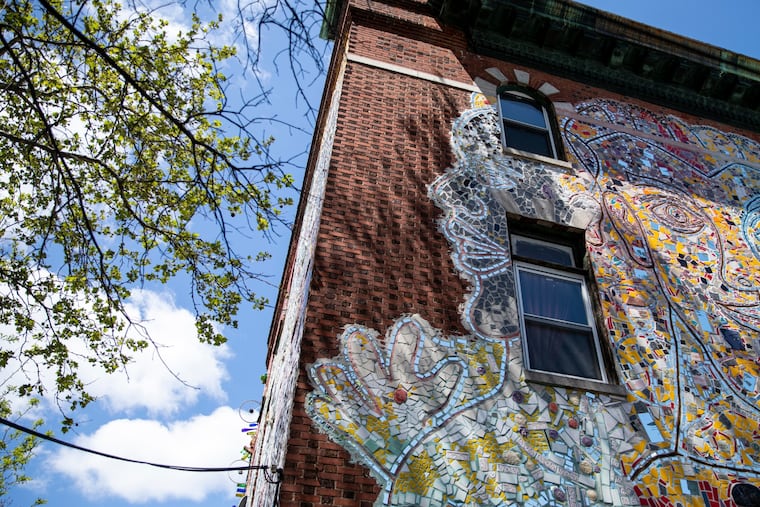What does Philadelphia sound like? Here’s what four composers came up with.
The Musical Fund Society of Philadelphia celebrates its 200th birthday with a set of new Philly-centric works.

Start along the path of mirrored glass shards and tile mosaics and turn right at the bike wheel.
Art is the center of the real world, a message on the floor reads.
On and on, past seashells, ceramic plates, and broken bottles, a surprising array of the flotsam and jetsam of life threads you through the Magic Gardens, the popular and fantastical South Street art installation created by Isaiah Zagar.
It’s an eyeful. What, though, would all that visual stimulation sound like translated into rhythm, melody, and harmony?
Augusta Read Thomas decided to find out. The Chicago-based composer’s Magic Gardens will premiere Sunday at the Perelman Theater by the Rolston String Quartet in a (pandemic-delayed) concert celebrating the 200th anniversary of the Musical Fund Society of Philadelphia.
“It’s an absolute treasure of Philadelphia,” says Thomas of Zagar’s creation. When she looks at it, it seems like “lots of little notes interlocking in a contrapuntal way. So musically it speaks to me.”
Somewhere beneath Philadelphia’s sirens and garbage truck belches, birdsong and horse hooves hitting Belgian block, the city has another soundtrack — something deeper that expresses its identity. Thomas and three other composers have been listening for it, and the resulting musical scores being unveiled Sunday capture aspects of the urban experience that could be nowhere but Philadelphia.
Composer Stephen Jaffe took his inspiration from bells — not the city’s most famous one, but the bell sculpture by Toshiko Takaezu at the Schuylkill near the Philadelphia Museum of Art and Reginald Beauchamp’s Whispering Bells sculpture outside of the African American Museum at Seventh and Arch Streets. Three Arcs will be performed by the Network for New Music Ensemble and Pennsylvania Girlchoir.
Roberto Sierra saw the “fleeting images” and bold colors of graffiti as a job for four saxophone players in Graffiti II, to be played by the PRISM Quartet.
In the Fields by Tania León — winner of the 2021 Pulitzer Prize in music — won’t be ready in time for Sunday’s concert. A song cycle inspired by Carlos Pintado after the Cuban American writer took a walk through Philadelphia, her work is now planned for a premiere by the Curtis Institute of Music’s 20/21 Ensemble next season.
“Choosing the composers was a big deal and a rigorous process,” says Musical Fund Society president Linda Reichert. The society asked 11 nominators to suggest eight to 10 composers representing a variety of styles. Each of the 104 recommended composers was then invited to submit two sample works to be screened for craft, style, and a “very strong compositional voice,” said Reichert.
Forty-eight submissions were received, and a panel of Philadelphia-area composers and musicians reviewed the scores without being told the names of the composers and pared them down to four. The composers were directed to write new works that would reflect some kind of Philadelphia theme.
Bringing new works to audiences is what the Musical Fund Society has done since its earliest days. Founded in 1820, the group was a major presenter of music in Philadelphia, hosting performances in Musical Fund Hall by touring artists — Charles Dickens, pianist Louis Moreau Gottschalk, and “Swedish nightingale” Jenny Lind, among them.
After a period of decline, the hall on Locust Street near Eighth was sold in 1980 to developers by the Philadelphia Redevelopment Authority for $25,000 and converted into condominiums. The building retains its historic (though not original) facade. Today, the Musical Fund Society supports musicians and the music scene through its grants and awards.
No Philadelphia composer ended up being chosen for the society’s bicentennial commissions, though Thomas does have a significant connection to the city in her past. Her husband, composer Bernard Rands, was composer-in-residence for the Philadelphia Orchestra in the 1990s. A bit later, she held the same position with the Chicago Symphony Orchestra.
“We had an apartment for seven or eight years in the Academy House. We lived there but I was commuting to Eastman,” she said, referring to the respected school of music in Rochester, N.Y.
Zagar was a presence in Philadelphia then — he was one of the pioneers of South Street’s renaissance in the 1960s — and his work was all around the city. Thomas remembers seeing it in her Philadelphia days, and more recently drew inspiration via the Magic Gardens’ online virtual tour.
The first movement of Thomas’ work is called “Scherzo” and uses a theme like a mosaic, with instruments answering each other, and the theme goes through a series of variations. “The variations are very imaginative. They’re short, but you never quite know what I’m going to do next, and that’s exactly like the Magic Gardens, because you turn the corner and you don’t know what you’re going to see,” Thomas said.
“Ceremonial,” the second movement, has a spiritual feel, and Thomas embeds the movement with ornaments, “almost like you’re trying to capture the whole vibe of somebody spending a life creating this work and many other works that Mr. Zagar made around Philadelphia and the world.”
Thomas says the Magic Gardens appealed to her with its “intricacy and the fantasy and the sort of handcrafted, every-little-piece-put-together-perfectly-with-the-hands-of-the-artist [aspect], and the plethora of different kinds of things floating around.”
The place has color, flair, caprice, and even humor, she says.
“And yet, it’s also a very serious place, the Magic Gardens, in the sense that it’s an epic, massive piece of art.”
Three of the Musical Fund Society’s four bicentennial commissions will be performed Sunday at 3 p.m. in the Perelman Theater, Broad and Spruce Streets. Tickets are $30. pcmsconcerts.org, 215-569-8080.